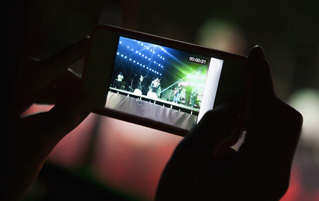6 Things You've Done This Week With Terrifying Side Effects

From television to computers to smartphones and other such porn delivery systems, technology is wonderful. Truly, there is no downside to a technologically advanced society ... except for all of the terrifying ones we're about to tell you. For example ...
Virtual Reality Could Cause Hallucinations

Every new thing that comes out is accused of ruining the entire world. It happened with comic books, rock & roll, video games, and now Google Glass. "You're walking distracted, that can lead to accidents!" The reasonable critics said. "You're probably watching porn all the time -- porn starring the devil!" The less reasonable ones insisted. So when news came out that Google Glass might mess with your brain, it probably tripped your bullshit sensors.

But there may be something to it. In a case study published in the journal Addictive Behaviors, a Glass user had to forfeit his device while undergoing rehabilitation. Soon, the man reported seeing his dreams through a narrow "gray window," as if he was experiencing them through his (now-absent) Google Glass. The researchers concluded that repeated use of the device had burned itself into the subject's subconscious mind, after which it slowly started leaking into his everyday life.

You know that thing where you play Tetris for too long, and suddenly you're mentally stacking everything you see? Science actually has a name for that. They call it "game transfer phenomena." Usually, the symptoms are perfectly benign, like seeing a particularly bitchin' rail and wondering how many points it's worth in Tony Hawk's Pro Skater. In rare cases, though, GTP can lead to hallucinations. In a Swedish study, one 15-year-old hardcore gamer reported seeing health bars over the heads of people he encountered in real life. Of course, no one has gone stomping on turtles and throwing their bloody shells at their neighbors -- it's nothing but a strange, rare little quirk.

For now, anyway. Researchers think that we might see more of this in the future as augmented/virtual reality tech becomes more prolific. Nobody's saying you should cancel your Oculus Rift pre-order, or even that if you play too much Kirby, you'll devour your children in an attempt to absorb their powers. We're merely saying that GTP may be about to become much more prominent, and you might occasionally find yourself cleaning your house by stacking all of your garbage together in an attempt to clear the line.
Digital Photos Might Be Ruining Your Memory

You know what's great? Stuff. But the problem with stuff is that there's too much of it for one person to remember. That's where digital cameras come in. No longer only a tool for photographing your Forbidden Zone, digital cameras allow us to immortalize every event forever, ensuring we never forget a moment of it. At least, that was the intention. But a recent study by psychologist Linda Henkel found that taking lots of pictures can in fact harm your memory.

In Henkel's study, participants observed artwork in a museum. Half of the participants were allowed to take digital photographs, while the control group was asked to simply observe it. The results later showed that the camera-less control group was able to recall far more detail about the artwork, despite the camera group presumably spending four times as long on each painting, lining up the shot just right so it looks like they're going down on Whistler's Mother.
Henkel called it the "photo-taking impairment effect" and it happens because our brains are lazy bastards that realized they could dump all the "remembering" responsibility on photos and sit back, relax, and think about puppies or something. However, Henkel's experiment only applies to those fire-and-forget pics we toss up on the Internet and never revisit. If you view the photo from time to time, you end up remembering more about it. So we suppose that the real lesson here is that Instagram is making you dumb. But anybody watching you take ten pictures of your lunch while it goes cold right in front of you knew that already.
Social Networks May Be Withering Your Heart

Past research shows a link between the size and intricacy of your circle of friends and the amount of gray matter in your amygdala, which is not the queen from the Star Wars prequels, but the part of the brain responsible for memory, decision-making, and emotions. Even online friends count -- social interactions via Facebook, Twitter, and Everypony may be somehow affecting your brain.
But here's why you might want to consider making more friends in meatspace anyway. We know that the brain and heart are linked via the vagus nerve. Its primary function is controlling your heartbeat and breathing, which, interestingly, both improve significantly with social interactions -- but only the real kind, not the Facebook poking kind.

In short, if your idea of a fun Friday night is refreshing the thread you started on The Winchester Family Business to see if there are any replies to your theory that Sam and Dean aren't blood related, so it's not weird if they make out, you should probably stop doing that. If not for the sake of your heart, then for ours, because they are breaking for you.
Video Games Could Be Wrecking Your Impulse Control

First-person shooters are all about fast-paced decision making. You have precious seconds before your opponent respawns -- to teabag, or not to teabag? There isn't much time to stop and think; the best gamers are the ones who can decide on the right course of action in a split second. It turns out that practice might be training your brain to react the same way in real life, according to research from the Society for Personality and Social Psychology. They claim that serious, prolonged reaction-based gaming can reduce a player's "proactive executive control," which is fancy science talk for "makes you an impulsive dipshit."

If true, this may lend some credence to the claim that video games promote violence, albeit tangentially. Even the study says they don't actually make you violent, but may contribute to attention problems, which can sometimes lead to loss of impulse control, which can sometimes lead to violence. Clearly with that daisy-chained logic, this research is not definitive. Plus, it did also find a positive link between first-person shooters and increased visual skills. So yeah, gaming might lead to poor impulse control, but it might also improve your aim, which is uh ... still not sounding super great, now that we think about it.
GPS Has Destroyed Our Sense of Direction

GPS is awesome. Without its soothing tones to guide us, we would spend hours blissfully barreling past our exit, continuing on forever until the road ended, and we were forced to make a new life wherever we landed. We're pretty sure that's how Arizona started. But GPS is jealous technology; it wants to be the sole navigation tool in your life, and it achieves this goal by demolishing your brain's internal pathfinding system.

As humans move through the world, our brains subconsciously create a mental map of the surrounding area. Before GPS and reliable maps, that was the only way primitive man could get around. You couldn't exactly pull over and ask for directions from a passing saber-toothed tiger, no matter how reassuring you found his smile. But much like with digital photography, scientists have found that our slacker brains will apparently jump at any opportunity to offload some work.

Studies revealed that GPS users later had difficulty drawing even a rudimentary map of their journey, meaning that they never mentally recorded it at all. Rely too heavily on your GPS, and you may be stranded forever when the service gives out, like a particularly pathetic Gilligan's Island reboot. Giving your biological GPS too many breaks might also lead to the deterioration of your hippocampus, the part of the brain that's responsible for mental mapping. A 2000 study of taxi drivers in London (who have to know all the routes around the city by heart) revealed that they had larger hippocampuses than the average person, simply because they trained them on a daily basis.

There's your new pickup line, cabbies: "You know what they say about cab drivers, right? The bigger the route, the bigger the ... hippocampus."
It's not great, but it beats the old classic, "Wanna bone in my backseat? Nobody puked back there today yet."
Our Phones Are Giving Us Anxiety

Nomophobia is the term for "the fear of being without a mobile device." It also seems like an excellent way to suss out nerds to beat up. What kind of hyper-dork is terrified of leaving their iPhone at home?
Apparently, most everybody.

In a recent survey of over 2,000 people, nearly 60 percent of smartphone users confessed to not going more than a single waking hour without looking at their phone. That means they're checking up on their devices during every conceivable activity -- family time, parties, romantic walks on the beach. Nine percent said they messed with their phone in church. Twenty percent said they'd rather give up their shoes than their phone. Though in their defense, what if a crazed gunman burst into your house and demanded to know what the yearly rainfall in Ulan Gom, Mongolia is? If you had a smartphone but no shoes, you could whip the phone at his head and then run away barefoot.

We're confident that is the only possible solution to that hypothetical problem.
For more ways we're destroying the world, check out 5 Nice Things You Do Daily (That Secretly Ruin the World) and 6 Tiny Things That Have Mind-Blowing Global Impacts.
Are you on reddit? Check it: We are too! Click on over to our best of Cracked subreddit.
Shocked by any of this? Click the Facebook 'share' button and spread the dreadful surprise.
And to further expand your noggin, check out Cracked's De-Textbook: The Stuff You Didn't Know About the Stuff You Thought You Knew.


